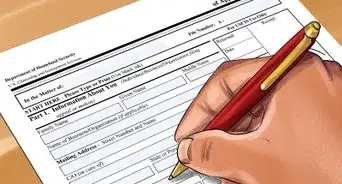This article was co-authored by Valery Cury. Valery Cury is an Immigration Attorney based in Santa Ana, California. With over seven years of experience, she specializes in affirmative cases. Valery earned her Master’s Degree from Brooklyn Law School and her Bachelor’s Degree in Law from Pontificia Universidad Catolica Madre y Maestra in the Dominican Republic. She is licensed to practice in the State of Connecticut. She’s also a member of the American Immigration Lawyers Association (AILA) and the Dominican Bar Association (DBA).
wikiHow marks an article as reader-approved once it receives enough positive feedback. In this case, 100% of readers who voted found the article helpful, earning it our reader-approved status.
This article has been viewed 443,421 times.
Having a green card, or permanent residence status, gives you the ability to legally live and work in the United States, and it's a step toward becoming a U.S. citizen. You can apply for a green card through your family, your employer, and for other special reasons. The process can take a long time, but the reward is great. Read on to find out what you need to do to obtain a green card.
Steps
Knowing Your Eligibility Category
-
1Determine whether you can get a green card through family. This is one of the most common ways to get a green card, and in many ways the simplest. If you're directly related to a US citizen, US immigration law allows your relative to petition for you to be able to live in the US.
- Many obtain a green card as the immediate relative of a US citizen. If you're a US citizen's spouse, unmarried child under the age of 21, or parent of a US citizen over the age of 21, your relative may be able to file Form I-130, Petition for Alien Relative. You would then follow up by going through the "Adjustment of Status" process to become a permanent resident of the US. The procedure is slightly different for people not already in the United States, and is referred to as "consular processing"; a visa is administered by the US Department of State, and you would become a permanent resident once you are admitted into the US.
- The procedure is similar, but slower, if you are trying to get a green card through an immediate relative who is a permanent resident, but not yet a US citizen.
- If you turn older than 21 or get married, your status as an immediate family member changes, and this can delay getting your green card under the "family" category.
- You can also get a green card through special family situations including being a battered spouse or child, a widow or widower of a US citizen, or a child of a foreign diplomat born in the US.
-
2Determine whether you are eligible to get a green card through a job. This general category is divided among many subcategories, but essentially entails all instances of green cards being issued for purposes related to a job offer, investment or having a specialized job. Determine whether one of the following situations applies to you:
- You've received a permanent job offer for employment in the US. If this is the case, your employer will need to get a labor certification[1] and fill out Form I-140, Immigrant Petition for Alien Worker.
- You want to get a green card through investment. If you're an entrepreneur and have made an investment of either $1,000,000 or $500,000 in a targeted employment area, and plan to create at least 10 jobs for US citizens, you can apply for a green card through investment. You'll need to fill out Form I-526, Immigrant Petition by Alien Entrepreneur.
- You have extraordinary abilities and want to self-petition for a green card. Very talented or extraordinarily skilled people who are considered to be the best in their field (Nobel Prize winners, top athletes, etc.) can self petition for a green card. This is an extremely rare category.
- You fall into a special job category. If you're an Afghan or Iraqi translator, an Afghan or Iraqi who assisted the US government, a member of the armed forces, or fall into another special category, you can get a green card that way.
Advertisement -
3Determine if you have fall into the refugee or asylee green card category. If you entered the US as a refugee or an asylee, or as an immediate family member of an asylee, you can apply for a green card 1 year after entering the country.
- If you're in the country as a refugee, it is mandatory to apply for permanent status after being in the country for a year.
- If you're in the country as an asylee, it is not mandatory to apply for green card status.
Filing Your Petition and Checking Visa Availability
-
1File the correct petition. Once you figure out what immigrant category you belong to, you'll need to have your family or employer file an immigrant petition for you. In rare cases, you'll file one yourself.
- If you're obtaining a green card through your family, your relative must file Form I-130, the Petition for Alien Relative.
- If you're obtaining a green card through your employer, your employer must file Form I-140, Petition for an Alien Worker.
- If you're an entrepreneur investing money, you need to file Form I-526, Immigrant Petition by Alien Entrepreneur.
- If you're in a special category such as a widow or widower, file Form I-360.
- If you're a refugee or asylee, you most likely don't need an underlying petition if you meet the requirements to adjust status.
-
2Check visa availability in your category. Once your relative, employer or you yourself file your initial petition, you need to check to see whether a visa is available before filing the remaining application forms. The number of visas available differs according to your immigrant category and the country from which you are emigrating.
- There are an unlimited number of visas available for people applying for a green card through immediate relatives.
- There is a limited number of visas available to those applying for green cards through family that is not immediate and for employment purposes. You will receive a priority date and be put on a waiting list until a visa becomes available.
- You'll receive a "Visa Bulletin" that will allow you to check your place in the visa queue.
-
3File Form I-485, Application to Register Permanent Residency or Adjust Status. You have to wait for a visa to become available before this form can be filed. Read the instructions on the form and make sure to submit all of the required documents and information. Be sure to send your forms to the correct address.
- If you're applying for a green card through an immediate family member, you can file form I-485 at the same time your relatives files your petition, since there are unlimited visas available in your category.
- There is a filing fee of $1070.
Finishing the Process and Getting Your Green Card
-
1Get your biometrics taken. You'll receive a notice calling you to go to an Application Support Center for an appointment during which you'll be fingerprinted, have your picture taken, and have your signature taken. The center will use this information to do a background check. Eventually your biometrics will be used to process your green card.
-
2Go to your interview. In some cases you might be called in for an interview with the USCIS office to answer questions about your application. If you receive a notice, make sure you attend the appointment. The notice should include the date, time and location of the interview.
- In some cases your family member who filed your green card petition might be asked to come to the interview as well.
- Bring your travel documents, passports, and all other relevant documents to the interview.
-
3Wait for your final decision and get your green card. The USCIS will review all of your paperwork, assess your interview if applicable, and make sure you meet all of the requirements to become a permanent resident. Once they make a decision, you'll receive a notice in the mail.
- If your application was denied, you may be able to file an appeal.
- If your application is accepted, you'll receive further instructions about getting your green card, including information on when it needs to be renewed.
Expert Q&A
-
QuestionHow can I get a green card by joining the military?
 Valery CuryValery Cury is an Immigration Attorney based in Santa Ana, California. With over seven years of experience, she specializes in affirmative cases. Valery earned her Master’s Degree from Brooklyn Law School and her Bachelor’s Degree in Law from Pontificia Universidad Catolica Madre y Maestra in the Dominican Republic. She is licensed to practice in the State of Connecticut. She’s also a member of the American Immigration Lawyers Association (AILA) and the Dominican Bar Association (DBA).
Valery CuryValery Cury is an Immigration Attorney based in Santa Ana, California. With over seven years of experience, she specializes in affirmative cases. Valery earned her Master’s Degree from Brooklyn Law School and her Bachelor’s Degree in Law from Pontificia Universidad Catolica Madre y Maestra in the Dominican Republic. She is licensed to practice in the State of Connecticut. She’s also a member of the American Immigration Lawyers Association (AILA) and the Dominican Bar Association (DBA).
Immigration Attorney Typically, the military are the ones that handle that directly for you. So, you'd express your interest in proceeding that way and they would go ahead and take care of that for you.
Typically, the military are the ones that handle that directly for you. So, you'd express your interest in proceeding that way and they would go ahead and take care of that for you. -
QuestionIf I go to the U.S. and marry a U.S. citizen, does that allow me to get a green card?
 Community AnswerIf you are married to a U.S. citizen you can apply for a green card. However, it is not easy and it is not guaranteed you will actually be approved to get one, so make sure you meet all the criteria.
Community AnswerIf you are married to a U.S. citizen you can apply for a green card. However, it is not easy and it is not guaranteed you will actually be approved to get one, so make sure you meet all the criteria. -
QuestionMy younger sister is a USA citizen. Can she apply for me?
 Community AnswerIf you get her to say you're going to live with her and be a dependent, or get her to help you set up a job, that will make things go faster.
Community AnswerIf you get her to say you're going to live with her and be a dependent, or get her to help you set up a job, that will make things go faster.
Expert Interview

Thanks for reading our article! If you'd like to learn more about getting a green card, check out our in-depth interview with Valery Cury.
References
About This Article
One way the most common and simplest ways to get a green card is through family. If you’re directly related to a US citizen, your relative can petition for you to live in the US. You may also be eligible to get a green card through your job if you’ve received a permanent offer in the US, you fall into a special job category such as a translator, or you have a extraordinary skill. Lastly, you may qualify for the refugee or asylee category. If you need to file an immigrant petition, you will have to obtain a visa, file an application, and pay a filing fee. If you want to learn more, like what to expect from an interview about your application, keep reading!
































































